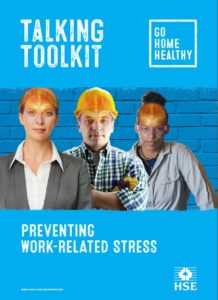Work-related stress
Preventing work-related stress

HSE has launched a ‘Talking Toolkit’, which focuses on work-related stress, put together with consultation from the construction industry.
 ‘It is noted that stress, depression and anxiety are the second biggest cause of work-related ill health in the construction industry. The earlier this problem is tackled the less impact it will have on workers and business and positive action can help to create a more engaged workforce, boost productivity and save money’, says HSE.
‘It is noted that stress, depression and anxiety are the second biggest cause of work-related ill health in the construction industry. The earlier this problem is tackled the less impact it will have on workers and business and positive action can help to create a more engaged workforce, boost productivity and save money’, says HSE.
HSE has worked with industry to produce a toolkit on this issue, focussed particularly at small businesses with a regular workforce (employed and contracted).
The toolkit focusses on six conversation topics:
- Demands;
- Control;
- Support;
- Relationships;
- Role;
The toolkit is aimed at businesses with a regular workforce (employed and contracted) who want to start looking at this issue. It will also help site managers wanting to identify project-specific issues.
The ‘Preventing work-related stress’ talking toolkit is available can be downloaded here.
Safety & Health Podcast
Subscribe and tune in the Safety & Health Podcast to discover the latest issues facing the health and safety profession, and stay on-top of the developments affecting your role, from working at height, lone working and common workplace hazards, to safety culture, behaviours, occupational health and mental health and wellbeing.
Listen as Peter Kelly, Senior Psychologist for the Health and Safety Executive, talks about work-related stress and the impact the coronavirus pandemic has had on employee mental health, and a discussion on the upcoming ISO45003 Standard.
Preventing work-related stress
HSE has launched a ‘Talking Toolkit’, which focuses on work-related stress.
Barbour EHS
SHP - Health and Safety News, Legislation, PPE, CPD and Resources Related Topics
Company fined as worker has leg amputated
Aviation company fined after worker death at Heathrow Airport
Gogglebox star George Gilbey died after fall through skylight

 ‘It is noted that
‘It is noted that